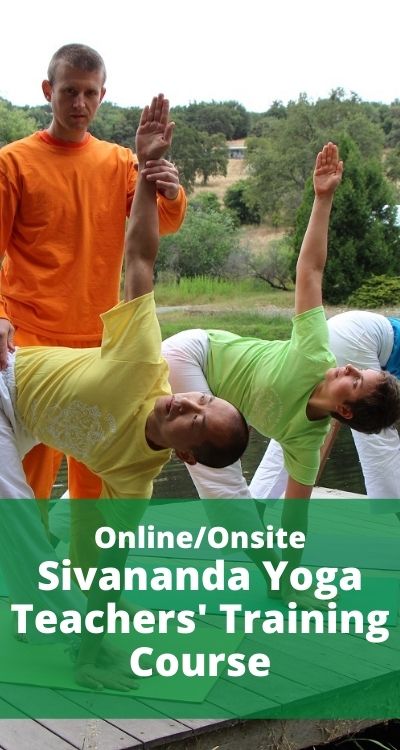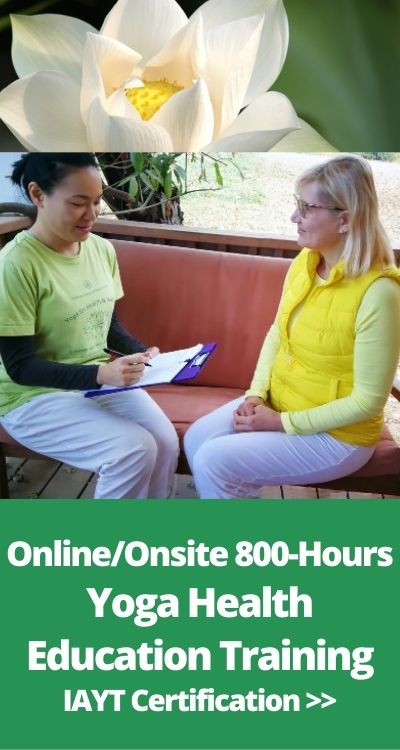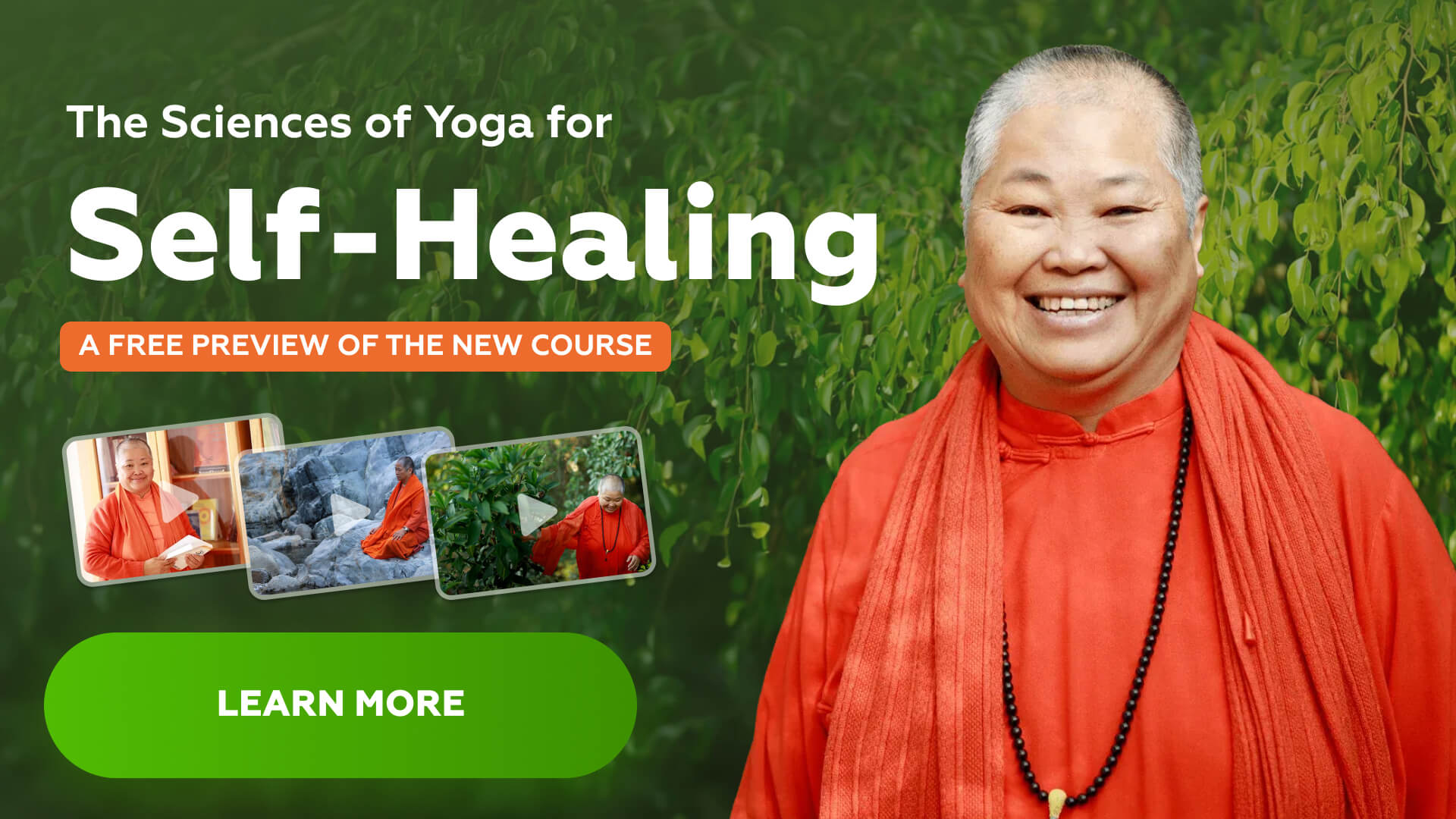Transcript from talk of Swami Sitaramananda Aug.15 2021
SUMMARY KEYWORDS
purpose, karma yoga, atman, selflessness, dharma, karma yogi, skill, karma, life, instrument, offer, ego, means, selfless, happy, happiness, practice, meaning, destiny , self realization, Bhagavad Gita, spiritual teaching.
The topic of today morning is about how to find your goal and your purpose in this life. Very often we find ourselves in transition, asking ourselves questions “What I’m going to do? What’s my next step? I like this, I like that, but I like this too. I don’t really know what to do”. Often times, we find ourselves in mild or severe depression, due to the sense of lack of direction and a feeling of meaninglessness. This is when we need to know about what our Dharma is.
What is Dharma?
Dharma means your highest duty or your mission in life, the right thing to do. We can talk about Dharma only if we understand the word Karma. The reason why we do not understand our Dharma is because we are functioning out of Karma. The level that you can get out of your karma or be detached from your karma is the level that you understand your Dharma. People know what they like, but they cannot do it, they cannot fulfill it. They live life and always feel frustrated, or always feel that they want to do something, but never can really do it.
The lucky ones are those who are able to do it, because of the circumstances of life and their inner motivations meet together and they feel fulfilled inside and outside. But you cannot blame the circumstances. If the circumstances are not favorable and you are not able to express yourself and fulfill your Dharma, you cannot blame the circumstances because it’s also your Karma. You have to work it out. Every situation is just perfect for you to work it out. It might take a long time, but if you do the correct practice, then you’ll be able to one day fulfill your Karma and Dharma both together. So, how to do this?
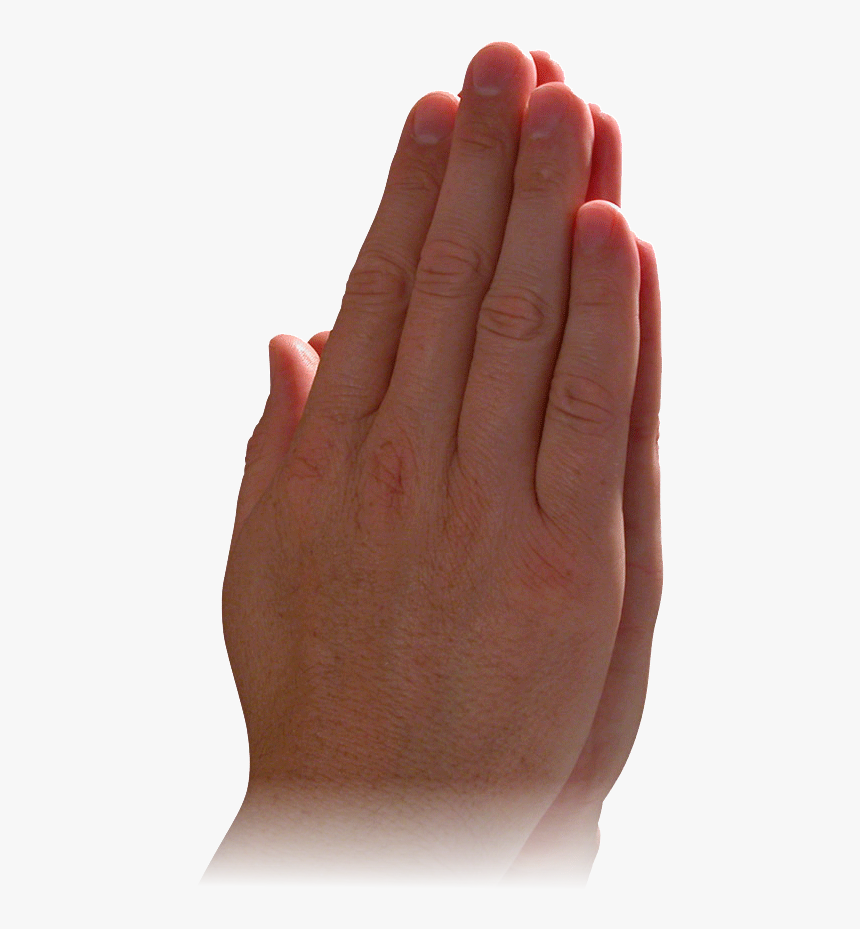
We need to understand Karma
When you are steeped in the karma, usually you are kind of in the dark. Karma means specific circumstances that you have to experience and live through because of the result of what you have thought and done in the past. And oftentimes it can be difficult, which means you are struggling. You are in the dark is not necessarily a happy state. Sometimes you might be happy and then again unhappy, happy and unhappy. It is not really the true picture. You’re still trying to understand what is asked from you. You are trying in this life using your means, your skills in order to be happy to get what you want. Sometimes you get what you want, and sometimes not. So, karma is something you have to experience, and it comes from a distant past. It sets up certain circumstances of your life.
Karmic relationship
Karmic relationships would help you eventually to see who you are, which is the immortal Atman that is in everybody. And it’s not the separate self that is different from everybody. Karmic relationships help you to find yourself. The purpose of struggling in work is not exactly the same as the purpose of struggling in relationships. Relationship is the question of love, the question of how to love and serve others as one’s own Self.
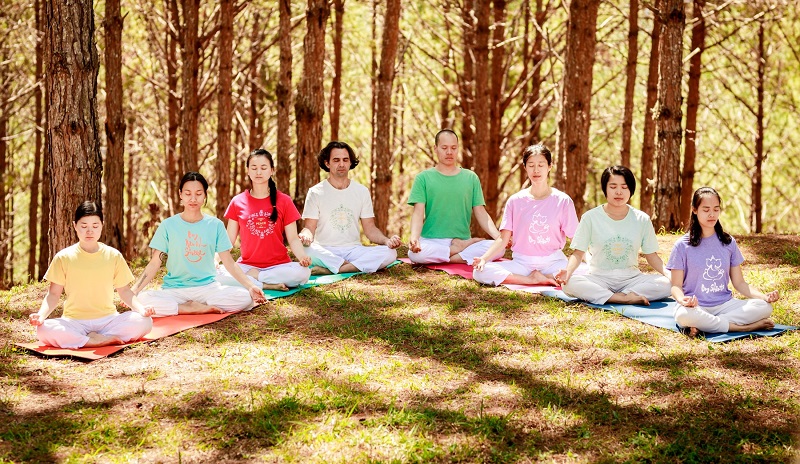
Your work – you are not the doer
Your work, your activity and what you find yourself doing, also can become your means to find yourself. You struggle with it, you try this and try that and eventually in that struggle, it’ll help you to know that you are not the doer or actor. The question of struggling in activity or in work is to ultimately find out that the energy that I have, the skill I have does not belong to me, and I’m only the instrument in the hands of the Divine. God is the supreme actor or doer and this body and mind are the instruments.
The moment you understand that, you will find peace. When you still have the idea of the doer-ship that means you are still thinking: “I am doing this, because I want this, and I like this”, “I don’t like this, and this is me against the world”. Then at that time, you’re still struggling, you’re still steeped in karma. Like I said at the beginning this means that you’re still looking, you’re still not finding peace.
Finding your Dharma starts with selflessness or Karma Yoga
It’s so simple. Dharma has to start with selflessness. If you want to find your Dharma, if you want to find your mission in life, “what is the purpose of my life?” then you need to practice what we call Karma Yoga or the yoga of selflessness. It means, in daily life, you would have to offer yourself to something higher and bigger, larger than yourself without condition, acting as an instrument of something higher. And then you will say, “I will be abused if I am selfless, I will be then taken advantage of”. It is not true because nobody can take advantage of you unless you allow it.
Because you are the one that owns your consciousness, yes or no? If you decide from your end this is what I like to do, then you can do it and offered it up consciously. Whether the person decides to take more or not it doesn’t really matter because it comes from you. You are the one that decided I want to offer this energy of mine. This time of mine is still mine. I offer to this person who is there, or I offer to God in my heart, it doesn’t really matter. The main thing is you are selfless, you are working on your selflessness. When you are working on your selflessness then you have no sense of “I own this, I own this effort, I own this work, I own this result.” This teaching is quite deep. It’s in the Bhagavad Gita, the main scripture of yoga. And Swami Sivananda wrote a book on “the practice of karma yoga”.
It is a spiritual question if you want to find your mission, your meaning, your highest purpose in life. It’s a very deep question. How do you know what your soul wants? Your mind always wants this and wants that and wonders and changes every time. Therefore, how do you know your highest purpose? How do you know your mission in life? Or how do you know why you’re born? It’s very difficult to know.

Starts with using your actual skills to serve selflessly
You have to sort it out from what you can do now in terms of selflessness, whatever that you can do selflessly. The more you can do this, the more your purpose will be revealed to you. You get that? The more you are able to be selfless in whatever you do, in your mind, independent from your circumstances, the more your purpose will be revealed to you. Whatever your circumstances, you still can find a way to be selfless, yes or no?
Put your heart into it and give up the results
Let’s say you are a mother. And you can be a selfless mother. Let’s say you are an employee, you can also be a selfless employee. Let’s say that you are a teacher, you can be a selfless teacher. What I mean is you put your heart into it, and you do the best you can, and you offer the result. Now, what does that mean? It means that you are detached from the results of your actions. If you are doing well, fine and good, if you are not doing well, fine and good. If the company becomes successful, fine and good or the company becomes bankrupt, and they think that it is your fault and they fire you, it’s fine and good also. But from your point of view, you practice selflessness. It’s not easy to do.
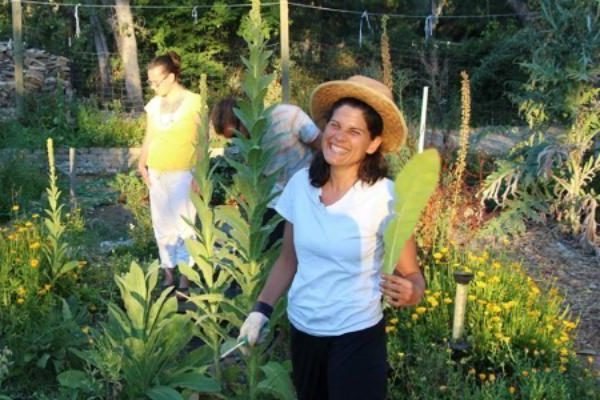
Egoism and selflessness
I believe in the talk yesterday, we brought up the definition of Patanjali about egoism. It is very nice. I’m still really enjoying the meaning of egoism: the association of the Atman with the instrument of seeing – the Antakarana. It is a technical term, Antakarana is the inner instrument. When the Atman is associating with the instrument, the mind, with what you like or do not like, with your personality and so on, then it becomes egoism. Self-realization means then the detachment or non-identification with your instrument of seeing, non-identification with your personality, non-identification with your ego, non-identification with your separate sense of self. That is selflessness.
Detach from the sense of I am the doer
Therefore, try to practice selflessness in whatever you do. Try not to think: “I like it, I don’t like it, and this is about me” or think: “Is people going to praise me? what do I get from this?” or feel:” it is a waste of my time!”. If you think like this, you’re still functioning out of your ego, you’ll still function out of that tight association of your Atman and your instrument of seeing.

What is Karma Yoga?
That’s why Karma Yoga is turning it around. It says just do whatever you need to do in front of you, do your duty, but turn it into selflessness and turn it into becoming an instrument. Because this is about action and it is not necessarily about emotion. Therefore, you use the word instrument, “I am only the instrument for this to happen”.
Then when you do that, you cancel out your Karma. You cancel out the strong attachment to your action, the strong attachment of the Atman – yourself, towards the action and the result of action. You detach from what you do, and from the result of what you do. So, in that way it works.
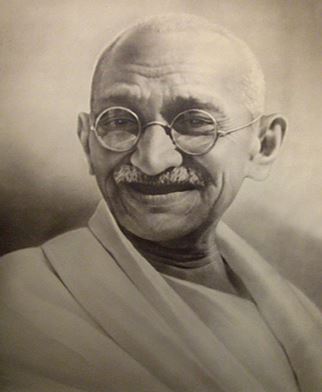
Also, karma yoga works to liberate yourself from this separate self, this body, this mind, or this separated life which you are very much identifying with if you are able to detach from what you’re doing and detach from the result of action.
This is why Karma Yoga- selfless action is being prescribed by all the teachers as a starting point on the journey of Self Realization. Why? Because we are very much identifying with this ego, or this separate individual self. Therefore, you have to keep turning it into something selfless, it’s very practical. You can actually see it when you work out of your own ego, and you can see it when you become selfless. It’s very practical.
How it works
Mark is a carpenter, he came here at the ashram. I don’t know how he came here. And then his skill was being used every day. I remember, all the time we said to him “this is a project for you, this is a project for you”. And then he did it. He didn’t complain. “Yeah. Okay. Let me see.” Yeah. He’s a very good karma yogi. People were praising him. “Oh, you did a good job. Thank you very much for fixing the screens of all the doors of the kitchen. No flies can come in and everything looks good. Thank you very much.” I see he did it and he did a good job. This is a karma yogi attitude, the attitude of selflessness.
Without him knowing, he gained some points, you can say some “punya”, some merit. Normally, what he’s going do with the same skill, he can go and do some work somewhere else and get paid for it because as a carpenter, or skilled carpenter, you get paid for your job. Here at the ashram what he has? He has some food, a bed for sleep, but he gets something that he cannot find elsewhere, he gets what we called the “punya” or the merit. The merit is the points that go in your bank account of your progress in life. In Indian theory, it is said when you die, the chief accountant from heaven is waiting for you when you go there.
In the Western theory, there may be some other name, but the chief accountant is waiting for you with the big register when you die. He’s there because he has taken accounts of all your actions, plus, minus, plus, minus, plus, minus… And he says: “well, that’s your balance, you can go here, and you can go there”. That means your consciousness would be elevated to this level or that level according to your balance. At that time, you don’t have the body, you don’t have to do anything.
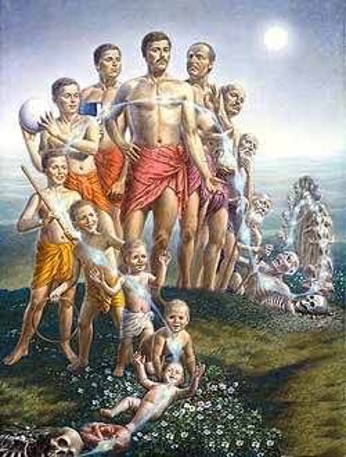
Then you enjoy life after life, you enjoy it according to your merit, and then you stay there until you finish your credit. It is like you go to live in a five-star hotel over a credit card. You have a credit limit. You can stay in the five-star hotel as long as your credit lasts. But when your credit finishes, then, sorry, bye bye. You have to go back and work again to put more money in the credit. That’s how it works. And then you have to be reborn on earth. And when you’ll be reborn on Earth, you will have the chance to have more credit, or to have more debit.
Therefore, to find your purpose in life, you need to practice selflessness and then it will be revealed to you. Mark for example does carpentry for the ashram because he has a skill. A skill is called your karma. He has a skill, but he offered that in karma yoga attitude. And then he might find his Dharma. He might find himself so happy to be just a karma yogi. Or maybe he will open a carpentry school for young men or young women to teach them skills to make a living. Yeah, he teaches them skills to make a living, but he does it in a selfless manner to uplift young people. And this is how he finds his dharma. Bingo! This is how you can find your dharma.
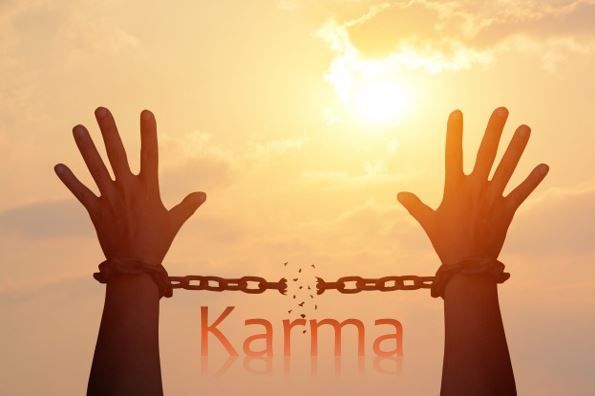
Turn it around
There is a story of an Indian woman I forgot her name, she’s kind of famous. Not famous like Mother Teresa but this Indian woman, she told her story. It’s a really heart wrenching story. She was abused when she was young, physically. And she was thrown out in the street, she went through quite a hard time. She had to do very bad jobs. She was also not only abused by the family, but also abused by the husband. The whole story is very long. Then she decided to open an institution. She gathered abandoned girls in the street and she started to open a home for girls that are abandoned, like her condition.
Slowly she adopted all these women that have been abandoned in the street and been abused. Her institution became so big. She became a really powerful force, to help these women. She told her story on the Internet. So, it’s like that. Her karma was being thrown on the street, and then being abused. But she turned that karma into her dharma. That’s what I’m talking about. Therefore, whatever happens to you, you can turn it around and you serve. At that time, you find your mission, your unique mission. Because God has given you the situation. Now, it might be difficult, because you still do not know. But that particular situation is your strength. Therefore, you turn it around, and you serve. And then that will be your stepping stone for liberation.
The moment that you become selfless, you detach yourself from whatever this life is about, whatever this personality is about, whatever this feeling is about, and then you’re free. So that’s it. That’s why everyone is yearning toward finding their dharma because they kept thinking: “I live my life, I go to work, I get the money, I can do what I want, but I don’t feel fulfilled, I feel that I have something to contribute to society, I feel that I want to be somebody, I want to have a purpose in my life.”
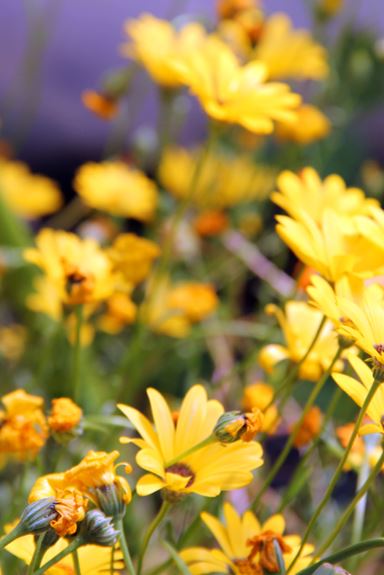
Now you have the formula, whatever you have, start with that. If you have a skill, how to sew for example. Let’s say in a COVID time, you are not a nurse, you’re not a doctor, to help people. But you know how to sew. You can sew face masks. And then you can donate to other people, that’s also your contribution. You start with this act, and eventually, you might find your mission. Gandhiji, he was a lawyer. What does a lawyer mean? He knows how to argue. He used that skill that he has to serve selflessly. He’s offering his skill. And he found his mission somehow to eventually help India free itself from colonialism. Now people still talk about his name. Whatever skill that you have, or whatever situation you struggle with, or whatever strength you have, offer it as selfless service.

MahaLakshmi, she’s doing a program called Good Karma Diet. She is a good cook. She turned it around and she teaches people how to cook. She got the proceeds from that and she wanted to help the animals. Then she asked if I could cook here and then get the proceeds and offer to the Animal Sanctuary that gathered these animals that have been mistreated, abandoned, and then to give the proceeds to the animal sanctuary. Swamiji said to MahaLakshmi: “I think I’m the one that tells you to cook.” In the beginning, she didn’t know how to cook, and then she learned how to cook.
She tried it on me in the beginning, then after she tried and tried, and she became good. She might find her mission in life, which is how to teach people how to cook vegetarian food and not to harm the animal and help the ecology and then this can open up to something else. It sounds like something very innocent. Somehow it comes to you with this skill and this intelligence because the moment that you start to find that connection with yourself and your contribution to society, and you serve selflessly, and the door opens, you feel better and better when you do that.
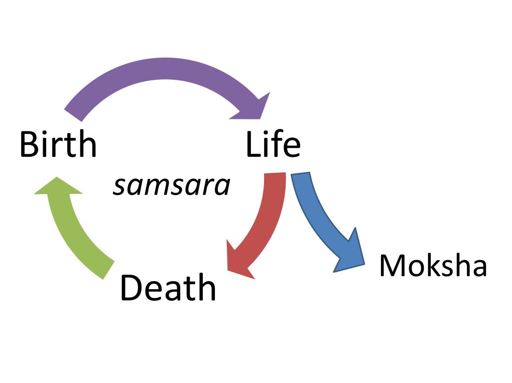
Bondage or liberation?
Dharma is to achieve Self Realization, Self-Realization cannot be achieved if you function out of your ego. Your Atman, which is your own True Self that you want to realize, is always associated with this body and mind, this likes and dislikes, this personality. So, when you offer up this personality and this skill, and this energy, this identification with your separate self, at that time, you slowly detach from that identification with the idea of who you are in a practical manner.
Then you realize the Self because the Self is always there, but it is obstructed by our mind, by our ego, or our false self. That’s why you need to work on that separation between the Atman and the ego, by detachment, and by offering it up. Because if you work, and then you want people to praise you, or you want some result, then it keeps you linked again to the mind. You understand? The mind likes something and wants the result out of that. The ego wants people to recognize you for that. And that will bind you instead of freeing you. You are going more toward being in bondage, being tied to this personality. Then you get so worried and anxious, you cannot sleep. Because you think that you don’t gain what you want. You are very much concerned about what you’re doing.
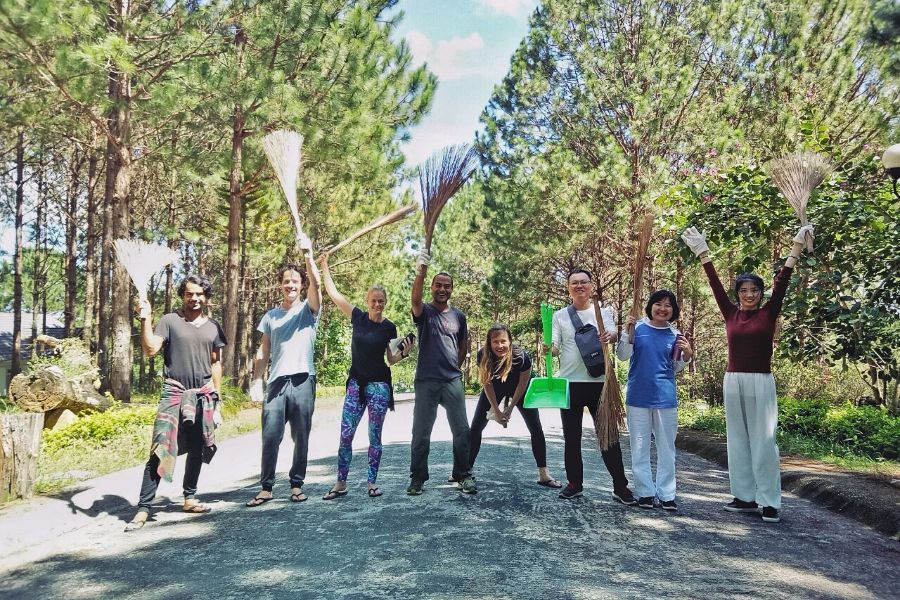
You can get yourself sick. So many people get sick out of worrying about how they perform. But if you do everything in the spirit of karma yoga then it’s okay. You do your duty, you do the best you can, you offer the result, so it doesn’t really matter. Therefore, you sleep well, you work hard. The energy comes from heaven because it comes from your soul, it comes from your Atman that is the source of everything, because you do it selflessly. So therefore, your Atman will make sure that you have the energy to do whatever is needed. And then you are free, and there is a light feeling to it, there is a happy feeling. If you experience it, you just want more of this light feeling. Consequently, you don’t want this feeling of worrying or feeling of heaviness, the feeling of winning and losing the feeling of being better than another person, or worse than another person, and the feeling that you are never good enough.

Karma Yoga spirit
The concerns about the ego really make you suffer. Because you are never enough, you can work hard, you can do everything, but you are never enough, you’re never perfect. You know this, if you do something it is never perfect. And if somebody comes and they destroy your work, you’re also angry, upset. You find yourself competing all the time with other people, and it takes all the joy out of life, but life is meant to be living joyfully. When you act selflessly you are joyful.
But if you do Karma Yoga and you are unhappy then something is wrong. I heard some people say I do karma yoga and I’m unhappy. It is because your ego is doing Karma Yoga, but your spirit is not embracing the selfless attitude of a karma yogi yet. You come to an ashram, and you are not being paid, does this mean you are doing Karma Yoga? Not necessary. Because it’s in the spirit. That spirit of Karma Yoga has to be built up for a long time because who wants to be selfless? Nobody. We like to be selfless, but it’s not necessary that we can cope with the practice of selflessness.
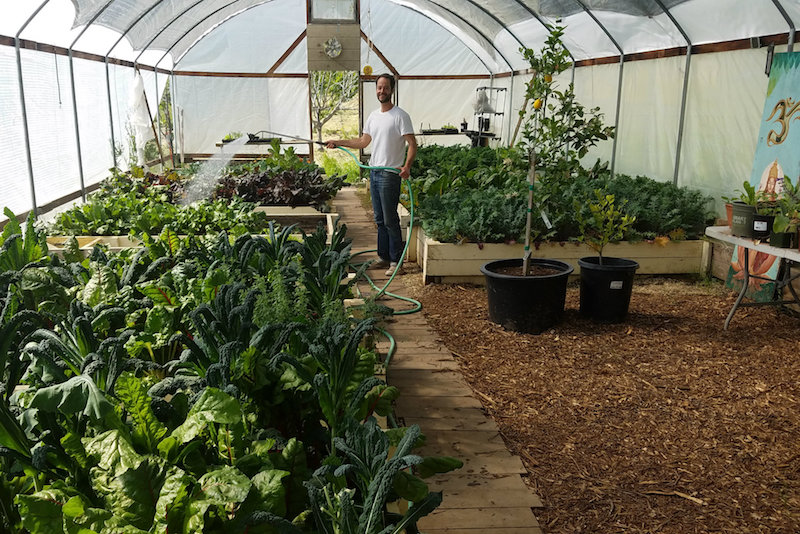
Well, sometimes we are selfless. And sometimes we are not selfless. Then we complain. So, in the process, sometimes you gain a lot out of this, like what I said, and sometimes you will feel you don’t like it. “When I came here, I thought I learned something and then I wash dishes all day long. I could do dishes at home why I came here and do dishes.” And then comes the complaining and blaming, “this cook doesn’t do their own dishes”, you look around at this person, “they’re not doing dishes, they’re just only sweeping, cutting flowers, they have such a nice karma yoga and they make me do dishes”. So, you complain. That’s normal in the practice of karma yoga. You don’t feel that unbounded joy. I’m telling you that it’s joyful.
But you have to practice long enough to find that joy. Don’t think that I’m sitting here, and I talk to you just like that. I have been a karma yogi for more than 40 years. Before yoga life, I was a social worker. I also did this selfless work, that’s part of my profession because people pay me to do social work, I had a big pay. But then I did selfless work at home in my free time without pay. I was full time selfless at work and my salary I gave to my family. And then the time that I dedicated to help other people was not paid. Eventually I quit, I quit that portion being paid, I retained a portion of not being paid. Then I became full time helping others without being paid. All the skills that I have learned I used for selfless service.

Karma Yoga spirit does not come easily, even though it’s the first yoga path. But I can guarantee you that after some time, if you do it one or two years you will start to like it. You’ll be surprised, we offer people to come and do seva-study here, that means study half and then work half. In the application form, we ask people to describe what is Karma Yoga, because we want people to know what they enter into, so they don’t come here and then feel that they’re being exploited or something. So, we ask people in the application form to write down what they are feeling about karma yoga. And the answers are amazing. We need to make a book out of that collection of answers. People come up with some extraordinary sentences in their application before they come to yoga. Before coming here, they already have an idea. To say that people are selfish it’s not exactly correct. Actually, I was surprised to see that people know what selflessness is, they have like a craving for selflessness. Many people wrote “I want to come to practice selflessness”. It is quite amazing. So please start and finish the book. Because the ashram is made out of Karma Yoga.
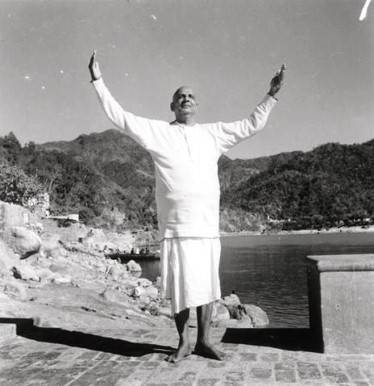
Gratitude
I have a lot of gratitude. I sit here, I always remember, wherever I look, a face of somebody just pop up, because I remember what they do. They came here, and they offer their skills. I have in my mind now the memory of all these people who did the flooring of the Yoga Hall, they were crawling on the floor to do the flooring. And this wood wall behind the altar was all done by Karma Yoga. You see that wall here, every bit of it is so beautiful. That’s why the ashram is beautiful, not because of the building. The building is just normal. There are many better buildings than the ones at the ashram. But the beauty of it is the energy that karma yogis put in when they do the work, because everything is built out of karma yoga.
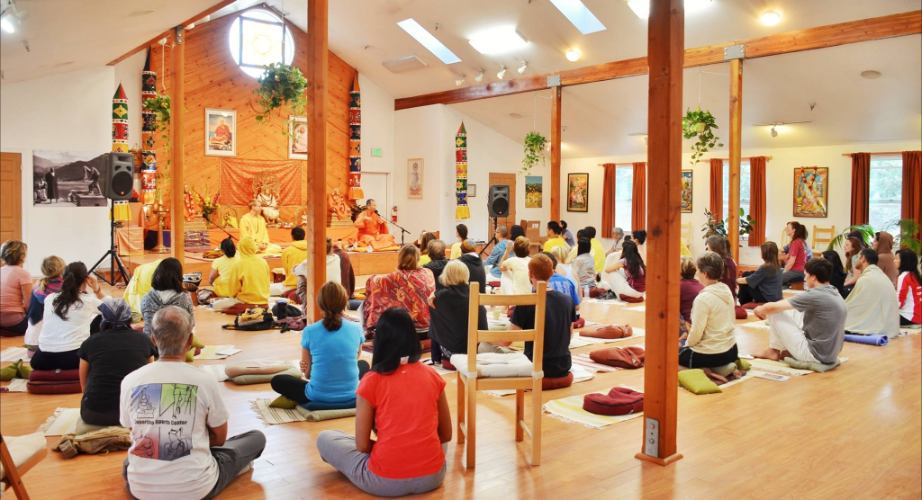
When I came here, there’s only an old farm house and there was no money. How did the ashram build up? From the sweat, and effort and the love of the Karma Yogis. I still remember that case. There’s one girl, she came from Europe. At that time, many people came from Europe here. This girl, a young girl, maybe 25 years old, came in just for a short period of time, like a week, not even as a karma yogi. When she came here, and at that exact moment we dug the floor of the farm house. Because the old farmhouse was sitting on no foundation, so we had to dig in the ground through the wooden floor, and then put a post, and pour the cement to support the floor.
This girl, very innocent, she’s traveling and came for about a week, exact at that moment. I remember, she spent the whole time that she was here in the basement. We had to work with the wheelbarrow, fill it up with concrete, roll it in, and transfer it to buckets to bring it down to a person underneath. They had to pour cement concrete posts down in the basement. It took longer than we thought. This girl spent her time in the basement doing cement. And she was happy. We don’t force people to do things. They’re happy to do it and they like to continue to do it. She was happy, and she was grateful when she left. And I’m grateful for my life for her doing this. Because it was a tough job and she was willing to do it. It was not an easy thing.
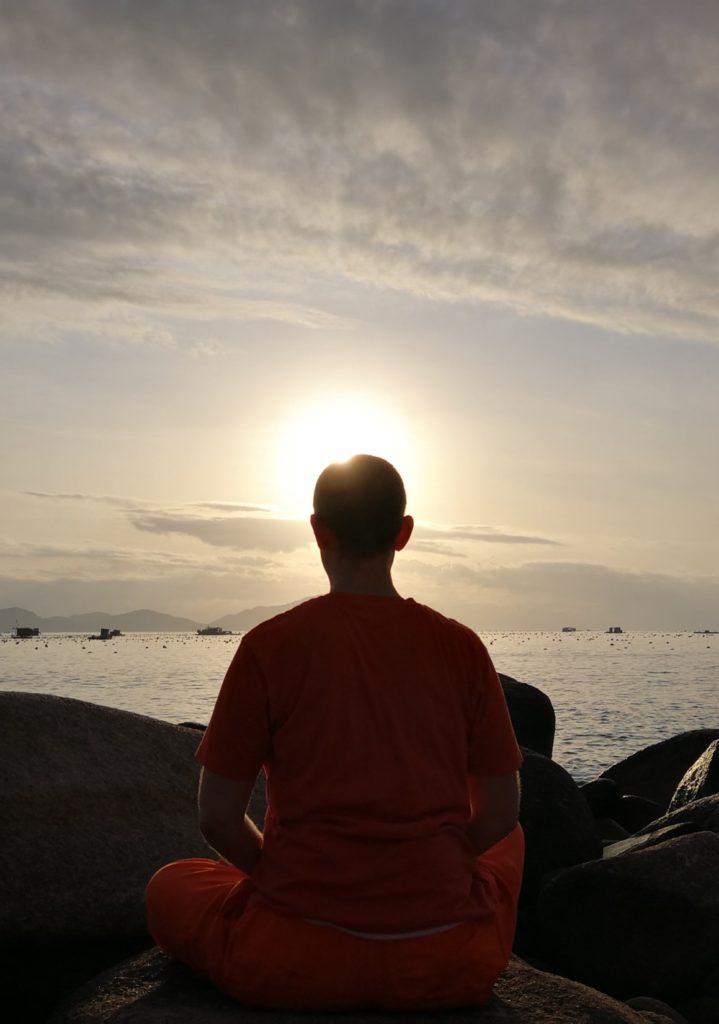
One day I will write a book about all the karma Yogis who have come to me. Because they have done incredible work. There were all kinds of people. There were also people that are angry. I still remember this man, a carpenter. For whatever reason, he came here. He was really disliking another karma yogi girl who was very devotional. She used to walk around with the basket of flowers singing like this. And this made the man irritated. One day he threw a chair on the girl. [it did not reach her, thanks God].
So, Karma Yoga is not all rosy, but it’s still one of the most important paths towards knowing oneself and being free from your karma. If you don’t practice this guideline of selflessness, you live your life and your karma will torture you. Because karma is never nice. It always comes as a contradiction, as a disillusion, as an unfulfilled feeling. You’ll be tortured by your karma. If you want to get out of your karma, then you can try baby steps to become selfless.
Hari Om Tat Sat.
Swami sitaramananda

